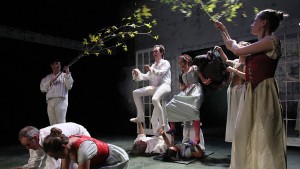 Bill Monroe and Doc Watson play “Sally Goodin” at the 1990 Delaware Valley Bluegrass Festival:
Bill Monroe and Doc Watson play “Sally Goodin” at the 1990 Delaware Valley Bluegrass Festival:
(This is the latest in a series of arts-related videos that appear in this space each Monday, Wednesday, and Friday.)
Terry Teachout on the arts in New York City
 “In the millionaire Undershaft I have represented a man who has become intellectually and spiritually as well as practically conscious of the irresistible natural truth which we all abhor and repudiate: to wit, that the greatest of evils and the worst of crimes is poverty, and that our first duty—a duty to which every other consideration should be sacrificed—is not to be poor.”
“In the millionaire Undershaft I have represented a man who has become intellectually and spiritually as well as practically conscious of the irresistible natural truth which we all abhor and repudiate: to wit, that the greatest of evils and the worst of crimes is poverty, and that our first duty—a duty to which every other consideration should be sacrificed—is not to be poor.”
George Bernard Shaw, preface to Major Barbara
In today’s Wall Street Journal “Sightings” column I take a closer look a theatrical controversy in Los Angeles that made national headlines. Here’s an excerpt.
* * *
 You may have heard about the tempest that blew up last week over “The Room,” Harold Pinter’s first play. Written in 1957, it was revived in Los Angeles by the Wooster Group, a New York-based experimental theater troupe. A few days before the show was set to open, the Wooster Group and Redcat, the Los Angeles theater presenting “The Room,” put out a press release stating that Samuel French Inc., which handles the U.S. rights to Pinter’s plays, had refused to license this one unless the following condition was observed: “There may be absolutely no reviews of this production.” In other words, Redcat couldn’t invite drama critics. Mark Murphy, Redcat’s executive director, responded by hinting very broadly that Samuel French was treading on the free-speech rights of both the company and the critics: “It seems strange to me that anyone would think critical discourse about this seminal play could be somehow harmful.”
You may have heard about the tempest that blew up last week over “The Room,” Harold Pinter’s first play. Written in 1957, it was revived in Los Angeles by the Wooster Group, a New York-based experimental theater troupe. A few days before the show was set to open, the Wooster Group and Redcat, the Los Angeles theater presenting “The Room,” put out a press release stating that Samuel French Inc., which handles the U.S. rights to Pinter’s plays, had refused to license this one unless the following condition was observed: “There may be absolutely no reviews of this production.” In other words, Redcat couldn’t invite drama critics. Mark Murphy, Redcat’s executive director, responded by hinting very broadly that Samuel French was treading on the free-speech rights of both the company and the critics: “It seems strange to me that anyone would think critical discourse about this seminal play could be somehow harmful.”
Free speech being the most sacred of journalistic rights, it stands to reason that the Los Angeles Times and the New York Times decided to run news stories about the controversy, and that the American Theatre Critics Association attacked the ban as ”objectionable behavior that tries to restrict not only artistic freedom of expression, but also freedom of the press.” Not at all surprisingly, Charles McNulty, the drama critic of the Los Angeles Times, bought a ticket and reviewed the show anyway. (For the record, he didn’t much care for it.)
But is that the whole story? Not quite.
To begin with, the Wooster Group goes in for high-concept productions that may or may not have anything to do with the plays they’re staging. When it produced Eugene O’Neill’s “The Emperor Jones” in 1992, the title role, written for a black actor, was played by a white woman in blackface. So I initially assumed that the Pinter estate had ordered Samuel French to put the squeeze on what Mr. McNulty described as the Wooster Group’s “postmodern high jinks.” Had that been the case, I might well have flown to Los Angeles to raise the free-speech flag by reviewing the show myself. But like many snap assumptions, this one didn’t stand up to closer scrutiny. In a statement of his own, Bruce Lazarus, Samuel French’s executive director, said flatly that the Wooster Group had “announced the Los Angeles premiere…before securing the rights” to “The Room” and that the Pinter estate “would have withheld the rights” had it been asked first….
* * *
Read the whole thing here.
Here’s my list of recommended Broadway, off-Broadway, and out-of-town shows, updated weekly. In all cases, I gave these shows favorable reviews (if sometimes qualifiedly so) in The Wall Street Journal when they opened. For more information, click on the title.
BROADWAY:
• An American in Paris (musical, G, too complex for small children, reviewed here)
• The Color Purple (musical, PG-13, most performances sold out last week, reviewed here)
• Fun Home (serious musical, PG-13, some performances sold out last week, reviewed here)
• Hamilton (musical, PG-13, all performances sold out last week, reviewed here)
• The King and I (musical, G, perfect for children with well-developed attention spans, reviewed here)
• Matilda (musical, G, reviewed here)
• Les Misérables (musical, G, too long and complicated for young children, closes Sept. 4, reviewed here)
• Noises Off (farce, PG-13, many performances sold out last week, closes March 6, reviewed here)
• On Your Feet! (jukebox musical, G, reviewed here)
OFF BROADWAY:
• The Fantasticks (musical, G, suitable for children capable of enjoying a love story, reviewed here)
• The Flick (serious comedy, PG-13, too long for young people with limited attention spans, reviewed here)
 • Sense & Sensibility (serious romantic comedy, G, remounting of 2014 off-Broadway production, closes April 10, original production reviewed here)
• Sense & Sensibility (serious romantic comedy, G, remounting of 2014 off-Broadway production, closes April 10, original production reviewed here)
IN SARASOTA, FLA.:
• Ah, Wilderness! (comedy, PG-13, closing April 10, reviewed here)
CLOSING NEXT WEEK IN SARASOTA, FLA.:
• Ma Rainey’s Black Bottom (drama, PG-13, closing Feb. 20, reviewed here)
CLOSING NEXT WEEK IN WASHINGTON, D.C.:
• Sweat (drama, PG-13, remounting of Oregon Shakespeare Festival production, closing Feb. 21, original production reviewed here)
I love aphorisms and epigrams, perhaps because I have no gift for coining them. The brilliantly precise concision that allows writers like La Rochefoucauld, Chamfort, and Karl Kraus to say big things on the smallest possible scale, and the discipline of mind that enables it, simply don’t come naturally to me.
For this reason, it’s always a joy for me to encounter a previously unknown aphorist (to me, anyway). George Weigel wrote a piece last week in which he had occasion to quote George Savile, the First Marquess of Halifax, a seventeenth-century British statesman of whose long career I knew nothing. In addition to being a politician of note, Savile was also a writer with a knack for terseness. Weigel points out that he “ranks second only to the immortal Dr. Johnson in the number of entries in The Viking Book of Aphorisms.” I own that book and consult it often, but for some reason Savile’s name had escaped my notice.
 I did a bit of nosing around the web and found that Savile’s aphorisms were collected in 1750 in a volume called Political, Moral and Miscellaneous Thoughts and Reflections. I promptly sifted through it and culled the following observations, which I hope you’ll find as striking as I did:
I did a bit of nosing around the web and found that Savile’s aphorisms were collected in 1750 in a volume called Political, Moral and Miscellaneous Thoughts and Reflections. I promptly sifted through it and culled the following observations, which I hope you’ll find as striking as I did:
• “Our vices and virtues couple with one another, and get children that resemble both their parents.”
• “Anger is never without an argument, but seldom with a good one.”
• “One should no more laugh at a contemptible fool than at a dead fly.”
• “The memory of an enemy admitteth no decay but age.”
• “Weak men are apt to be cruel, because they stick at nothing that may repair the ill-effect of their mistakes.”
• “Mistaken kindness is little less dangerous than premeditated malice.”
• “Explaining is generally half-confessing.”
• “A long vindication is seldom a skilful one.”
• “The world is nothing but vanity cut out into several shapes.”
• “Were it not for bunglers in the manner of doing it, hardly any man would ever find out he was laughed at.”
• “The reading of most men is like a wardrobe of old clothes that are seldom used.”
• “It is some kind of scandal not to bear with the faults of an honest man.”
• “All are apt to shrink from those that lean upon them.”
An ArtsJournal Blog